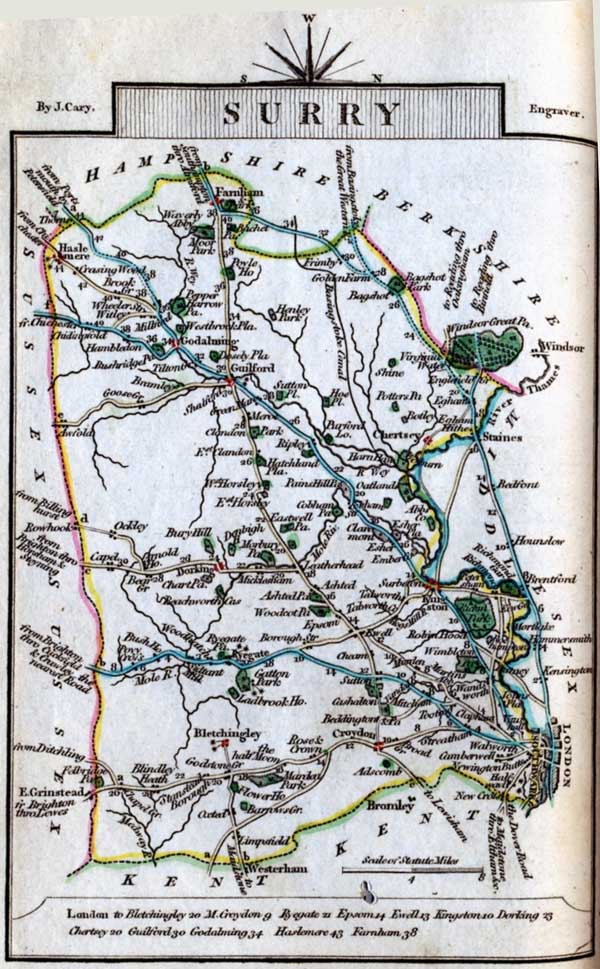A Topographical and Statistical Description of the County of Surrey, to which is prefixed a Copious Travelling Guide forming a Complete County Itinerary, etc. (1810) by George Alexander Cooke , Editor of The Universal System of Geography
Kingston-upon-Thames was so called to distinguish it from Kingston in Yorkshire. It is a market and corporation town, and gives name to the hundred, in which it lies. In the fourth, fifth, and sixth years of Edward II and the forty-seventh of Edward III, it sent members to parliament, but in consequence of a petition from the corporation they were relieved from this burthen.
King John granted to the men of Kingston the manor of the town in fee-farm, paying to the crown the annual rent of £50. He likewise granted them exemption from sheriffs or bailiffs jurisdiction. Henry III confirmed this charter, and granted still further privileges and immunities, which various succeeding monarchs confirmed and added to. Queen Elizabeth granted the freemen an exemption from paying toll, and being summoned on juries.
James I. granted a weekly market upon Saturday, with a toll, and empowered the bailiff and corporation to make bye-laws, and to keep a common gaol. Charles I granted them a jurisdiction of action and pleas within the town and liberty of Kingston, and the hundreds of Elenbridge, Cropthorn, and Effingham, impowered them to hold a court of record, and a session, and to erect a prison, within the liberties. He granted also that no market should lie held within seven miles of the town, and in consideration of their resigning their right of holding a court-leet and view of frankpledge within the hamlets of Richmond, Kew, Petersham, and Ham, he granted a leet in the rest of the hundred, and a return of writs in the hundred, in the hundreds of Cropthorn and Effingham. Charles II. granted them a weekly market on Wednesdays. James H. gave them a new charter of incorporation by the name of the mayor, aldermen, and burgesses of Kingston, with power to hold a court of record, and a court-leet. They acted under this charter during his reign only having ever since been governed by their ancient charters, which were confirmed by Charles the Second. The corporation consists of about fifty members.
Kingston was a place of some note in the earlier periods of our history. A council was held here in 838, at which Egbert, the first king of all England, his son Athelwolf, and all the bishops and nobles of the land were present. In the record of this event the town is called '' Kyningeston, famosa lila locus."
The Town Hall, which stands in the market place, was built in the reign of Queen Elizabeth. The south end was re-built in the reign of James I when the painted glass was put up in the windows.
The weekly market is held on Saturdays and there are three annual fairs held on the days mentioned in our list.
A Free Grammar School was founded by Queen Elizabeth upon the site of an ancient chapel dedicated to St. Mary Magdalen, which on the Suppression was seized by the crown.
William Cleave, Esq. alderman of London, who died in 1667, founded an Almshouse in this town, for the building of which he left £500 and endowed it with lands for the support of twelve poor persons. The present income is upwards of £120 per annum.
Kingston Bridge is the most ancient on the river Thames, except that of London. It is mentioned in a record of the eighth year of Henry the Third.
Fairs: Thursday, Friday and Saturday in Whit week, horses and toys. August 2, horses. August 3,4 fruit and pedalry. November 13, horses, cattle and toys.
Inns: Castle, Bull, Griffin , Swan.
Use the "Show me" link to locate Kingston on the map. You may need to scroll down to see Kingston highlighted.


 Chapter 4
Chapter 4 
 Chapter 28
Chapter 28 
